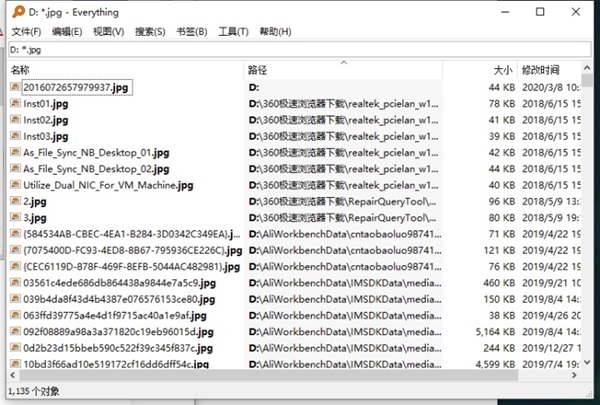
php editor Youzi brings you an introduction on how to quickly search for Everything. Everything is an efficient local file search tool that can help users quickly locate files. This article will introduce the search syntax usage and techniques of Everything in detail, allowing you to easily master how to use Everything to conduct fast and accurate file searches and improve work efficiency.

1. Use wildcards: 'Everything' supports wildcard search. For example, use the asterisk * to match any character, and the question mark ? to match a single character. For example, if you want to find all files starting with 'win10h', you can enter [win10h*].
2. Use Boolean operators: Use Boolean operators such as AND, OR and NOT to combine search conditions. For example, entering [win10h AND 2024] will find files containing 'win10h' and '2024'.
3. Use quotation marks: If you want to search for file names that contain spaces or special characters, you can use quotation marks to enclose the entire search phrase. For example, entering ['project 2024'] will find files containing the complete phrase, while entering ['project' 2024] will find files containing both 'project' and '2024'.
4. Search by file type: If you only want to find files of a specific type, you can add the file extension before the search term. For example, entering [.pdf] will only find PDF files.
5. Exclude specific files or folders: Use the '-' symbol to exclude specific files or folders. For example, entering [project -old] will exclude project files containing 'old'.
6. Limit the search scope: If you only want to search a specific folder or disk, you can add the path before the search term. For example, entering [D:\Documents] will only search in the specified path.
7. Search by attributes: Use keywords and attributes to narrow the search scope. For example, entering [size:>1MB] will only list files larger than 1MB.
8. Regular Expression Search: If you are familiar with regular expressions, you can use them in searches for advanced searches. For example, use [.\d{4}.] to find file names containing four digits.
9. Query all empty folders under the specified path [Path empty:] For example, [D:\TEST empty: ] Query the empty files under the D:\TEST path.
10. Query all empty folders under the specified path [Path dupe: ] For example, [D:\TEST dupe: ] Query the duplicate files under the D:\TEST path.
11. Find large files[size:>xxmb] For example, [size:>100mb] finds files larger than 100mb.
12. Query all files in certain formats under a certain disk [Path: ext: extension; extension] For example, enter [D: ext: gif; jpg] to search for all extensions under the D disk For .jpg and .gif files.
13. Search all files in a certain format under certain disks[
Everything is a very flexible and powerful file search tool. With these skills and functions, you can more easily find and manage files on your computer, improving work efficiency and file organization. Whether you're using it personally or in a work environment, these tips will help you get better use of this tool.
The above is the detailed content of How to search everything quickly? Introduction to everything search syntax usage. For more information, please follow other related articles on the PHP Chinese website!
 win10 bluetooth switch is missing
win10 bluetooth switch is missing
 Why do all the icons in the lower right corner of win10 show up?
Why do all the icons in the lower right corner of win10 show up?
 The difference between win10 sleep and hibernation
The difference between win10 sleep and hibernation
 Win10 pauses updates
Win10 pauses updates
 What to do if the Bluetooth switch is missing in Windows 10
What to do if the Bluetooth switch is missing in Windows 10
 win10 connect to shared printer
win10 connect to shared printer
 Clean up junk in win10
Clean up junk in win10
 How to share printer in win10
How to share printer in win10




